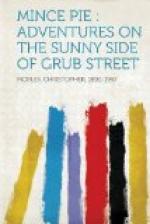So it is that sometimes, in the lulls of telephoning and signing contracts and talking to salesmen and preparing estimates and dictating letters “that must get off to-night” and trying to wriggle out of serving on the golf club’s house committee, my friend flings away his cigar, gets a corncob pipe out of his desk drawer, and contemplates his key ring a trifle wistfully. This nubby little tyrant that he carries about with him always makes him think of a river in the far Canadian north, a river that he visited once, long ago, before he had built up all the barbed wire of life about his spirit. It was a green lucid river that ran in a purposeful way between long fringes of pine trees. There were sandy shelves where he and a fellow canoeist with the good gift of silence built campfires and fried bacon, or fish of their own wooing. The name of that little river (his voice is grave as he recalls it), was the Peace; and it was not necessary to paddle if you didn’t feel like it. “The current ran” (it is pathetic to hear him say it) “from four to seven miles an hour.”
The tobacco smoke sifts and eddies into the carefully labeled pigeonholes of his desk, and his stenographer wonders whether she dare interrupt him to ask whether that word was “priority” or “minority” in the second paragraph of the memo to Mr. Ebbsmith. He smells that bacon again; he remembers stretching out on the cool sand to watch the dusk seep up from the valley and flood the great clear arch of green-blue sky. He remembers that there were no key rings in his pocket then, no papers, no letters, no engagements to meet Mr. Fonseca at a luncheon of the Rotary Club to discuss demurrage. He remembers the clear sparkle of the Peace water in the sunshine, its downward swell and slant over many a boulder, its milky vexation where it slid among stones. He remembers what he had said to himself then, but had since forgotten, that no matter what wounds and perplexities the world offers, it also offers a cure for each one if we know where to seek it. Suddenly he gets a vision of the whole race of men, campers out on a swinging ball, brothers in the common motherhood of earth. Born out of the same inexplicable soil bred to the same problems of star and wind and sun, what absurdity of civilization is it that has robbed men of this sense of kinship? Why he himself, he feels, could enter a Bedouin tent or an Eskimo snow-hut and find some bond of union with the inmates. The other night, he reflects, he saw moving pictures of some Fiji natives, and could read in their genial grinning faces the same human impulses he knew in himself. What have men done to cheat themselves of the enjoyment of this amazing world? “We’ve been cheated!” he cries, to the stenographer’s horror.
He thinks of his friends, his partners, his employees, of conductors on trains and waiters in lunchrooms and drivers of taxicabs. He thinks, in one amazing flash of realization, of all the men and women he has ever seen or heard of—how each one nourishes secretly some little rebellion, some dream of a wider, freer life, a life less hampered, less mean, less material. He thinks how all men yearn to cross salt water, to scale peaks, to tramp until weary under a hot sun. He hears the Peace, in its far northern valley, brawling among stones, and his heart is very low.




